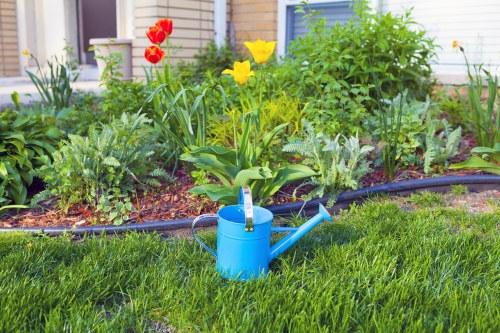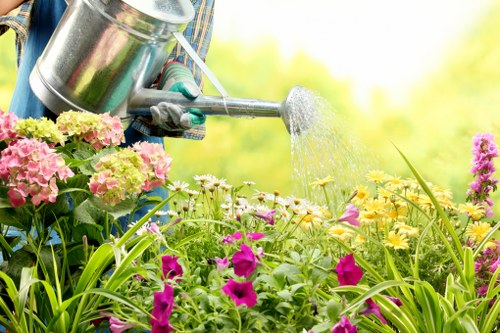Comprehensive Guide to Driveway Algae Removal in Neasden

Maintaining a clean driveway is essential for both the aesthetic appeal and the longevity of your property. In Neasden, a common challenge homeowners face is the growth of algae on driveways. Algae not only tarnishes the appearance of your driveway but can also make it slippery and potentially hazardous.
Understanding the causes of algae growth is the first step in effective removal. Algae thrive in damp, shaded environments, making driveways that receive minimal sunlight prime locations for their development. Additionally, moisture from rain and poor drainage can exacerbate the problem, providing the perfect breeding ground for these unwanted green invaders.
Addressing driveway algae promptly is crucial to prevent extensive damage. Ignoring the issue can lead to more severe problems, such as surface degradation and increased slipperiness, which poses safety risks for both pedestrians and vehicles.

Effective Methods for Algae Removal
There are several methods available for removing algae from driveways in Neasden, each with its own set of advantages. Choosing the right method depends on the extent of the algae growth, the type of driveway surface, and your personal preferences.
One of the most common methods is pressure washing. This technique uses high-pressure water to blast away algae and other contaminants from the driveway surface. It's effective for removing superficial algae growth and restoring the driveway's original appearance without the use of chemicals.
Alternatively, chemical treatments can be employed to eradicate algae. Algaecides and other specialized cleaning agents are formulated to kill algae at the root, preventing regrowth. While chemical methods can be highly effective, they require careful handling to avoid damage to the driveway surface and surrounding vegetation.

Natural Remedies for Sustainable Cleaning
For those seeking environmentally friendly solutions, natural remedies offer an effective alternative to chemical treatments. Vinegar, baking soda, and hydrogen peroxide are popular choices for combating algae without harming the environment.
Vinegar, with its acidic properties, can effectively kill algae and remove stains from driveway surfaces. Baking soda serves as a gentle abrasive, aiding in the scrubbing process, while hydrogen peroxide acts as a natural disinfectant to eliminate lingering spores.
These natural methods not only provide a safe cleaning alternative but also reduce the environmental impact associated with chemical use. They are especially suitable for driveways surrounded by plants and other sensitive flora.

Preventive Measures to Keep Algae at Bay
Prevention is always better than cure, and the same holds true for algae growth on driveways. Implementing preventive measures can significantly reduce the chances of algae development, ensuring a clean and safe driveway year-round.
Improving drainage around the driveway is essential. Proper drainage prevents water accumulation, a key factor that contributes to algae growth. Installing drainage systems or regrading the driveway can help direct water away from the surface.
Additionally, increasing sunlight exposure by trimming overhanging branches can create a less hospitable environment for algae. Algae thrive in shaded, damp areas, so maximizing sunlight can naturally inhibit their growth.

Choosing Professional Algae Removal Services in Neasden
While DIY methods are effective for minor algae issues, persistent or extensive growth may require professional intervention. Hiring a professional algae removal service in Neasden ensures thorough cleaning and long-lasting results.
Professionals have access to specialized equipment and cleaning agents that can effectively eliminate algae without damaging the driveway surface. They also offer expertise in identifying underlying issues that contribute to algae growth, providing comprehensive solutions.
Investing in professional services not only saves time and effort but also ensures that your driveway remains in optimal condition, enhancing the overall value and safety of your property.
Regular maintenance is key to preventing algae recurrence. Scheduling periodic cleanings and inspections can help maintain a pristine driveway and address any emerging issues promptly.
In addition to cleaning, addressing environmental factors such as moisture levels and shade can create an inhospitable environment for algae. By taking a proactive approach, homeowners in Neasden can enjoy clean, safe driveways throughout the year.
Ultimately, effective driveway algae removal in Neasden requires a combination of proper cleaning techniques, preventive measures, and, when necessary, professional assistance. By understanding the challenges and adopting the right strategies, you can keep your driveway algae-free and maintain the beauty and safety of your property.
Areas Near Neasden Benefiting from Algae Removal Services

Neasden is surrounded by several vibrant communities that also experience similar challenges with driveway algae growth. Here are some of the closest areas to Neasden that can benefit from professional driveway algae removal services:
- Willesden: Adjacent to Neasden, Willesden shares similar environmental conditions, making algae removal essential.
- Colindale: Known for its vast green spaces, Colindale residents often seek algae removal to maintain their driveways and pathways.
- Stonebridge: With a mix of residential and commercial properties, Stonebridge requires effective algae treatment solutions.
- Kilburn: Kilburn’s proximity to Neasden makes it a prime area for algae removal services.
- Dollis Hill: The shaded driveways in Dollis Hill are prone to algae growth, necessitating regular maintenance.
- Hendon: Hendon homeowners prioritize algae-free driveways to enhance curb appeal.
- Willesden Green: This area benefits from preventive algae removal to preserve the integrity of driveways.
- Mapesbury: Mapesbury residents often engage in algae removal to keep their driveways safe and clean.
- Brondesbury: Algae control is a common requirement for Brondesbury’s residential driveways.
- Brixton: In Brixton, algae removal services help maintain both aesthetics and safety on driveways.
Additional Tips for Maintaining a Clean Driveway
Beyond regular cleaning and preventive measures, homeowners can adopt additional practices to keep their driveways algae-free:
- Seal Your Driveway: Applying a sealant can create a protective barrier against moisture and algae growth.
- Improve Ventilation: Ensuring proper airflow around the driveway can help reduce moisture levels.
- Regular Inspections: Periodically check for early signs of algae and address them promptly.
Implementing these tips not only enhances the effectiveness of algae removal but also prolongs the lifespan of your driveway. Consistent maintenance ensures that your property remains both attractive and safe for years to come.
Conclusion
Driveway algae removal in Neasden is a vital aspect of property maintenance that should not be overlooked. By understanding the causes, employing effective removal methods, and implementing preventive strategies, homeowners can maintain pristine driveways and ensure the safety and beauty of their homes.
Whether opting for DIY solutions or seeking professional services, taking proactive steps against algae growth will pay off in the long run. Embrace the strategies outlined in this guide to achieve and maintain an algae-free driveway, enhancing both the functionality and appearance of your property.
Frequently Asked Questions
- How often should I clean my driveway to prevent algae growth?
It's recommended to clean your driveway at least twice a year. Regular maintenance helps prevent algae buildup and keeps your driveway looking its best.
- Can I use household cleaners to remove algae from my driveway?
Yes, household cleaners like vinegar, baking soda, and hydrogen peroxide can be effective for minor algae removal. However, for extensive growth, professional treatments may be more suitable.
- Is algae growth harmful to my driveway?
While algae itself doesn't directly damage the driveway, the moisture it retains can lead to surface degradation and increased slipperiness, posing safety risks.
- Are there eco-friendly methods for algae removal?
Absolutely. Natural remedies such as vinegar and baking soda provide environmentally friendly alternatives to chemical treatments, effectively combating algae without harming the surroundings.
- When is the best time of year to address algae removal?
Spring and autumn are ideal times for algae removal, as the weather conditions are favorable for cleaning and the growth cycle of algae is less aggressive.


